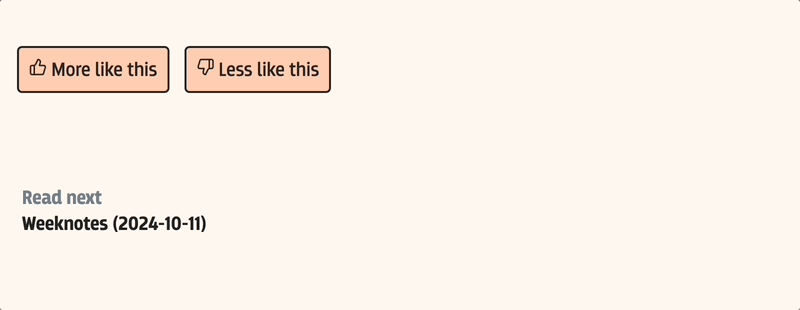 I need to smooth out the animations, but implementing feedback on the blog is good enough for now.
I need to smooth out the animations, but implementing feedback on the blog is good enough for now.This week I added feedback buttons at the bottom of my blog posts. One great thing about rolling your own website is that you can experiment with stuff easily, so these feedback buttons are an experiment in using generative AI to make quant data more human. Try them out to see what I mean.
Experimentation in a non-linear world
I listened to a couple of really good podcasts. Dror Poleg is always great and in this conversation he doubles down on his thesis that the world is becoming increasingly non-linear (his way of describing the increased complexity). In a non-linear world, you can't rely on what has worked before and you can't rely on what's worked for others.
A couple of suggestions from him on how to deal with that: - Apply the barbell risk strategy (i.e. 80% extremely conservative and 20% extremely risky) beyond investments and to your own career. "Don't try to do that middle thing of like, I'm just going to follow some kind of clear, predictable path because that path probably doesn't lead to where you think it leads." - The most successful people and orgs will be those that serve a specific niche. So because matching will be at the heart of value creation, make it easy for the world to match you with their problems.
The second podcast was with Max McKeown who I've not come across before. I think his core messages are fairly aligned with Dror Poleg's thinking: Stability is an illusion. Look at other orgs, people, or countries who are succeeding where you are failing and, here's the crucial bit, "not just cherry picking; understanding how that's been achieved and looking at things strategically with some big picture." He advocates experimentation with, and adaptation of, the things you want to adopt. Not just blind copying.
Both of these point to the end of 'best practice' and I'm a fan of that. Looking at out of industry precedents is certainly a key part of my innovation work with clients, and I'm sure it is for most people operating in the space. Similarly in applied behavioural science, doing a literature review and seeing what interventions have worked for similar challenges is bread and butter. The crucial thing is to know whether the problem you're facing is complicated or complex. Complicated? Then you might be able break it down into component parts and 'fix' something by borrowing something that worked elsewhere. Complex? Then the only way to understand how the system will respond is to interact with it. Try, experiment, and adjust as you get feedback from the system.